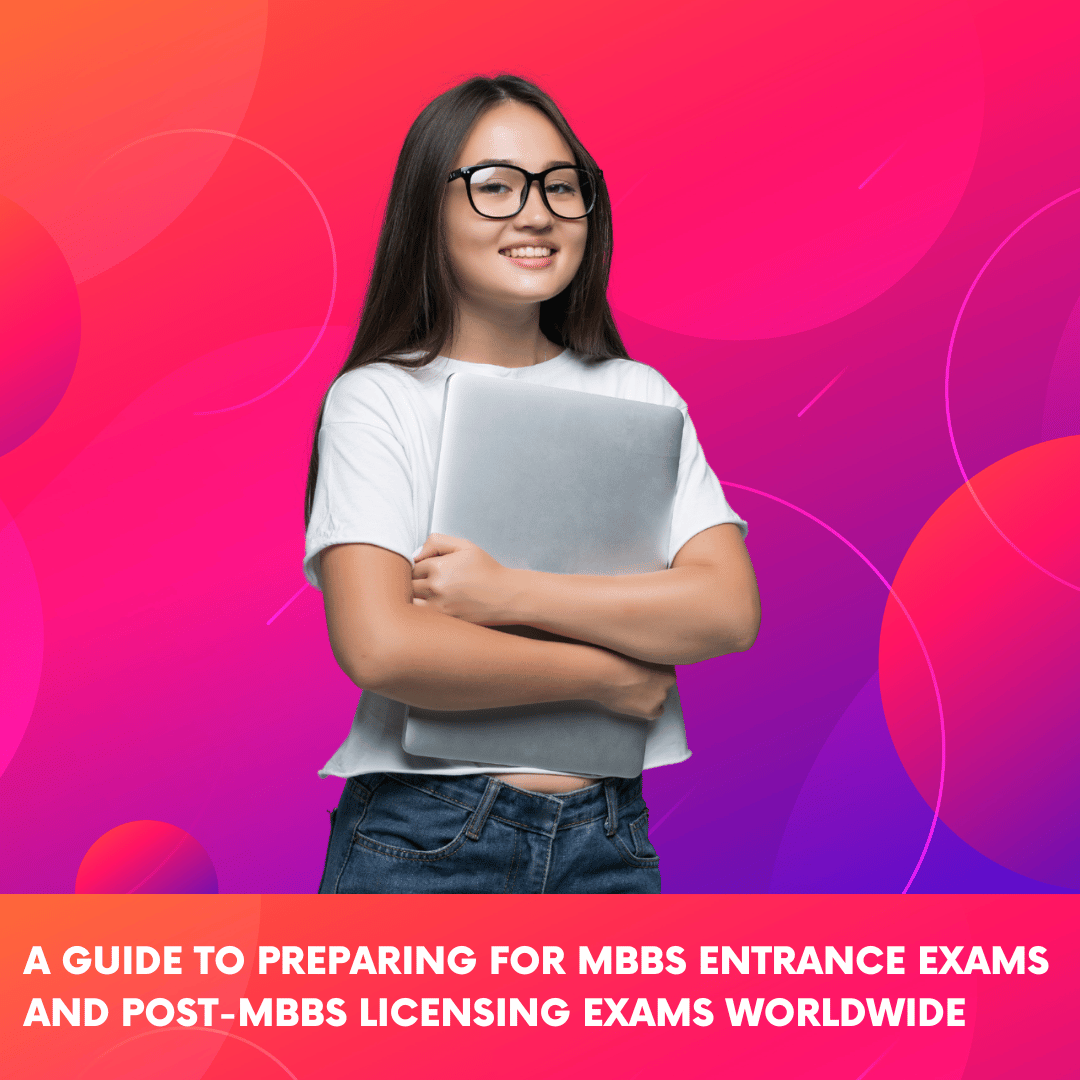A Guide to Preparing for MBBS Entrance Exams and Post-MBBS Licensing Exams Worldwide
Pursuing a medical degree abroad opens up global opportunities for aspiring doctors, but it also requires successfully navigating multiple exams. From the competitive MBBS entrance exams that secure your seat in a medical program to the essential licensing exams needed to practice medicine post-graduation, each step requires dedicated preparation and strategy.
In this blog, we’ll cover the essentials for acing entrance exams for MBBS programs around the world, as well as key licensing exams that international medical graduates must pass to practice in their desired countries.
Section 1: Preparing for Competitive MBBS Entrance Exams Worldwide
MBBS entrance exams are a crucial first step for anyone aspiring to study medicine. Each country has its unique exams with specific requirements, so it’s important to understand the differences to effectively prepare. Here’s a breakdown of some of the most important entrance exams worldwide.
1. National Eligibility cum Entrance Test (NEET) – India
- Overview: NEET is the main entrance exam for MBBS, BDS, and other medical programs in India, and it’s also accepted by many international institutions.
- Subjects Covered: Physics, Chemistry, and Biology.
- Preparation Tips:
- Understand the Exam Pattern: NEET comprises 180 multiple-choice questions (90 for Biology, 45 each for Physics and Chemistry).
- Use NCERT Books: NCERT textbooks form the core of the NEET syllabus, so ensure you master these thoroughly.
- Practice Mock Tests: Time management and practice are crucial. Mock tests and past papers are excellent for building exam stamina.
2. Medical College Admission Test (MCAT) – USA, Canada
- Overview: The MCAT is widely used by medical schools in the U.S., Canada, and some international programs to evaluate applicants’ readiness.
- Subjects Covered: Biological and Biochemical Foundations, Chemical and Physical Foundations, Psychological, Social, and Biological Foundations, and Critical Analysis.
- Preparation Tips:
- Focus on Critical Thinking: MCAT tests critical thinking, so practice analyzing and interpreting information.
- Take Practice Exams: Simulating the exam experience helps you get accustomed to the timing and question format.
- Utilize Prep Resources: Several companies offer structured prep courses, study guides, and online resources tailored to MCAT.
3. BioMedical Admissions Test (BMAT) – UK
- Overview: BMAT is used by top medical schools in the UK, Netherlands, and Singapore to assess scientific knowledge, problem-solving skills, and writing ability.
- Subjects Covered: Thinking Skills, Scientific Knowledge and Applications, and a Writing Task.
- Preparation Tips:
- Brush Up on GCSE-Level Science: A good understanding of high school-level Biology, Chemistry, Physics, and Math is essential.
- Practice Past Papers: Familiarizing yourself with the format and timing is key. Review past BMAT papers for practice.
- Work on Writing Skills: BMAT includes an essay, so practice structuring arguments concisely and coherently.
4. Gaokao (China)
- Overview: Gaokao is a highly competitive entrance exam used for admissions in Chinese universities, including MBBS programs.
- Subjects Covered: Various subjects based on streams; medical aspirants focus on Physics, Chemistry, and Biology.
- Preparation Tips:
- Start Early: Gaokao requires years of dedicated preparation due to its rigorous structure and heavy competition.
- Take Practice Exams Regularly: Chinese students often take mock tests to improve speed and accuracy.
- Seek Guidance: Many students use specialized prep schools for extra support, given Gaokao’s competitive nature.
5. Other Exams
- IMAT (Italy): Used for medical program admissions in Italy, covering Biology, Chemistry, Physics, Math, and general knowledge.
- UMAT (Australia): Replaced by the UCAT ANZ, which assesses mental ability, science aptitude, and personal qualities for medicine and dentistry programs.
Section 2: Post-MBBS Licensing Exams Around the World
After earning an MBBS degree, graduates must pass licensing exams in their chosen country to practice medicine legally. These exams ensure that doctors have the necessary skills and knowledge to provide safe medical care. Here’s a look at major licensing exams worldwide and tips for effective preparation.
1. United States Medical Licensing Examination (USMLE) – USA
- Structure: The USMLE has three steps:
- Step 1: Focuses on basic sciences and foundational medical knowledge.
- Step 2 (CK): Assesses clinical knowledge and patient care skills.
- Step 3: Tests medical knowledge and management of complex patient cases, generally taken after graduation.
- Preparation Tips:
- Create a Long-Term Study Plan: Each step of the USMLE requires months of dedicated study. Break down topics and review consistently.
- Use Question Banks: Resources like UWorld and Kaplan offer extensive question banks that simulate real exam questions.
- Focus on High-Yield Topics: Prioritize core topics that are frequently tested, such as pathology, physiology, and pharmacology.
2. Medical Council of Canada Qualifying Examination (MCCQE) – Canada
- Structure: The MCCQE is a two-part exam:
- Part 1: Assesses medical knowledge and clinical skills.
- Part 2: Evaluates clinical competence through Objective Structured Clinical Examinations (OSCEs).
- Preparation Tips:
- Use Canada-Specific Prep Resources: Exam prep companies like CanadaQBank specialize in MCCQE practice.
- Simulate OSCEs: Practice with study partners to build confidence for the clinical scenarios tested in Part 2.
3. Professional and Linguistic Assessments Board (PLAB) – UK
- Structure: The PLAB test has two parts:
- PLAB Part 1: A multiple-choice exam focusing on medical knowledge.
- PLAB Part 2: An OSCE-based exam assessing practical clinical skills.
- Preparation Tips:
- Understand NHS Guidelines: Since PLAB is designed for the UK healthcare system, familiarize yourself with NHS protocols and practices.
- Practice for the OSCE: Part 2 is practical, so simulate real-life scenarios and focus on patient communication skills.
4. Foreign Medical Graduate Examination (FMGE) – India
- Overview: The FMGE is a screening test required for international medical graduates to practice in India.
- Preparation Tips:
- Focus on Core Subjects: Prioritize high-yield subjects such as anatomy, pharmacology, and pathology.
- Practice MCQs: The FMGE is a multiple-choice exam, so use question banks for targeted practice.
- Study Indian Medical Guidelines: Understanding India-specific medical protocols can help, especially if there are any differences in treatment approaches.
5. Australian Medical Council (AMC) – Australia
- Structure: The AMC has two parts:
- AMC CAT MCQ Exam: Covers multiple-choice questions on clinical and medical sciences.
- AMC Clinical Exam: An OSCE that assesses practical skills.
- Preparation Tips:
- Focus on Australian Medical Standards: Study resources that align with Australian healthcare guidelines and standards.
- Take Practice Exams: Simulating the AMC exams with practice tests will improve familiarity with the format and timing.
6. Other Licensing Exams
- National Board of Examinations (NBE) and NEXT: India’s NBE conducts specialty exams, and the NEXT (National Exit Test) is a proposed exam for licensing and postgraduate admissions.
- Singapore Medical Council (SMC): Requires international graduates to pass a certification exam, with specific pathways depending on the country of graduation.
Tips for Success in Licensing Exams
Regardless of where you plan to practice, these general strategies can help you prepare for any licensing exam:
- Develop a Study Schedule: Set a daily and weekly study schedule with achievable goals, including review time.
- Use High-Quality Resources: Invest in well-reviewed study materials, question banks, and prep courses specifically tailored to your exam.
- Take Mock Exams: Mock exams simulate real testing conditions, helping improve time management and boost confidence.
- Practice Clinical Scenarios: For OSCE-based exams, practicing clinical scenarios with peers can help reinforce procedural skills and patient interactions.
- Prioritize Mental and Physical Well-being: Regular breaks, a balanced diet, and exercise can reduce stress and keep you sharp for exam day.
Conclusion
Pursuing an MBBS degree and preparing for licensing exams requires dedication, resilience, and focused preparation. With Eclave’s guidance, you can navigate every stage of this journey—from securing admission to a top medical school abroad to preparing for licensing exams in your desired country. By understanding the requirements and utilizing effective study techniques, you can achieve success and embark on a rewarding international medical career.
Start your medical journey with confidence by choosing Eclave’s expert guidance for your MBBS and licensing exam preparation. Your dream of becoming a globally recognized doctor is closer than you think!

